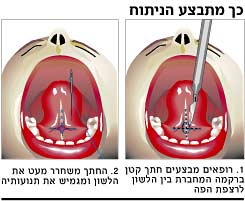Language / Korean children are sent for private surgeries so they don't speak English with an Asian accent

By Tamara Traubman and the "Haaretz" service
English course for Asians - a distant vision or an existing reality?
Parents in South Korea, a society where a lot of emphasis is placed on education, are eager for their children to become good at speaking English. But recently they stopped being satisfied with fluent and eloquent English; Now they also want their children to speak English without an Asian accent.
To this end, recently parents have been dragging their children to private clinics to perform surgery on them, which has recently become fashionable in the country. The surgery involves a small cut in the tongue that should allow children to pronounce words like "Rice" without sounding like "Lice." Every month about 10 children, all of them not yet five years old. "Parents are eager for their children to speak English, so they want them to do the surgery."
In surgery, the doctors cut a small incision in the tissue connecting the tongue to the floor of the palate. The surgery allows for a more flexible tongue, which can be lifted and extended to a greater distance. However, speech therapists claim that there is no basis for the Korean parents' belief that the surgery contributes to their children's polished accent.
"These are nonsense," says Chaya Levy, speech therapist and director of the Audiology Institute at the Hadassah Ein Kerem Medical Center. "The Koreans do not pronounce letters like r, simply because it is not found in their language. There is nothing to do with the surgery to improve the (English) accent, the pronunciation of the Lord is generally done in a deeper place in the mouth."
Prof. Eli Dan, specialist in otolaryngology at "Hadasa" Ein Kerem, explains that although the operation is considered an easy procedure from which the recovery is quick, but in children it is always done under general anesthesia. "This is an old procedure. It used to be customary to do the surgery in almost every case where the connective tissue was particularly large or long, because it was thought that it interfered with the correct steering and cutting of speech. Today it is done in rare cases. There is no justification for doing it except in extremely extreme cases, and in fact, this procedure has almost gone out of medical practice." Levy believes that when such surgery is not done out of medical necessity, it is unethical.
But, as mentioned, in South Korea the operation is now receiving a renewed refinement.
Since most surgeries are done in private clinics, there is no organized database that indicates the number of surgeries performed. However, doctors report that its popularity is growing in parallel with the prosperity of English studies. In Seoul, most surgeries are done in the Apkojung neighborhood. In the neighborhood there are about a dozen plastic surgery clinics where this type of surgery takes place, alongside well-known designer stores such as Gucci and Gilles Sander.
In their eagerness for their children to become better at speaking English, parents spend large sums of money, sometimes entire monthly salaries, on English lessons for kindergarten children and private tutors. The English teaching industry in South Korea includes, among other things, courses given after school hours, textbooks and video tapes, and its value is estimated at about 3 billion dollars - this figure does not include the thousands of children who are sent to English-speaking countries to sharpen their skills.
"Learning English is almost the national religion," says Jonathan Hilts, host of a popular English-language talk show on South Korea's educational television.
But on the other hand, an opposite trend is developing: in the public debate going on in the media, psychiatrists and educators claim that the method of learning English is wrong. They report cases of preschool children suffering from anxiety as a result of excessive stress.
The counter-trend was recently summarized by the Korean weekly ""Dong-A" in a cover article that bore the title: "English makes children's lives hell!".
English courses are also very common in Israel, and have become a necessary commodity in recent years. In addition to the growing need to know English in senior positions, which increases the demand for an English study course. There is a great demand for English language studies also due to the large number of people working in the high-tech field in Israel, who are required to speak English frequently when communicating with their colleagues overseas.
